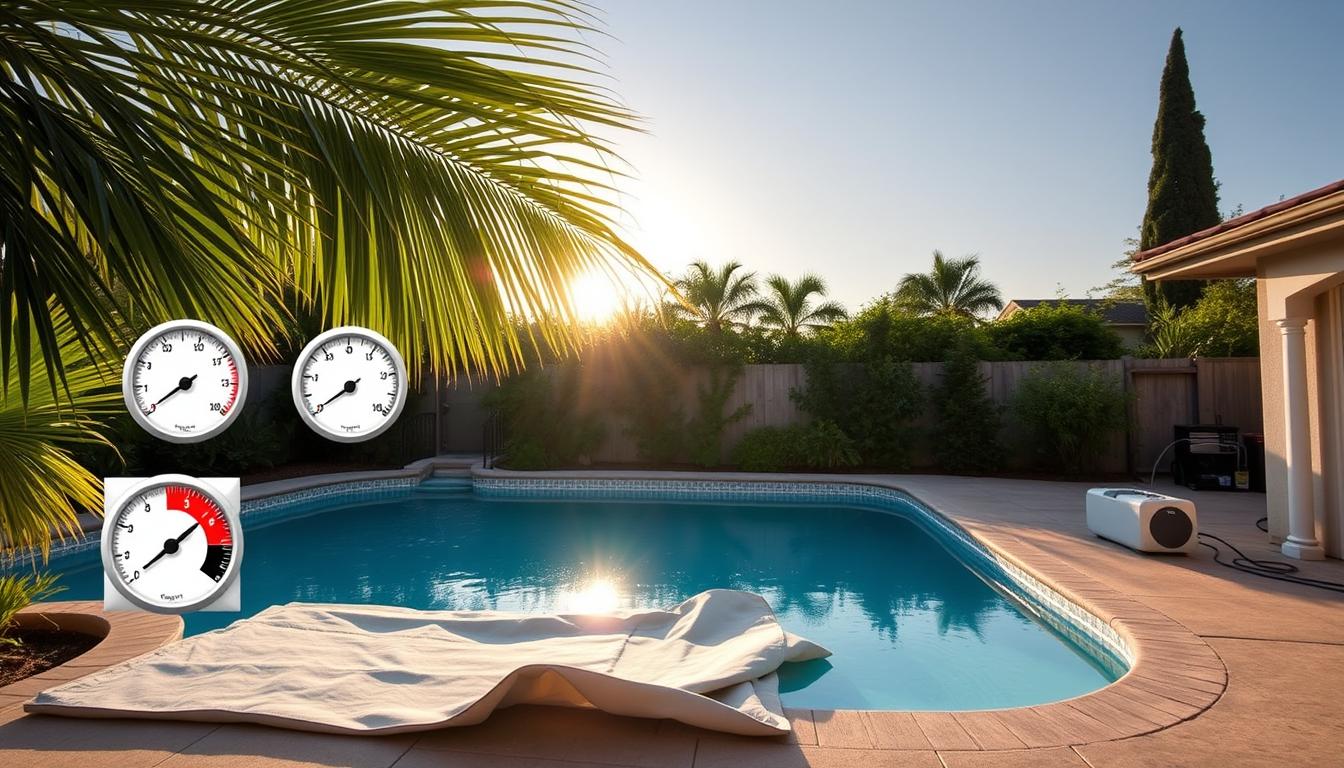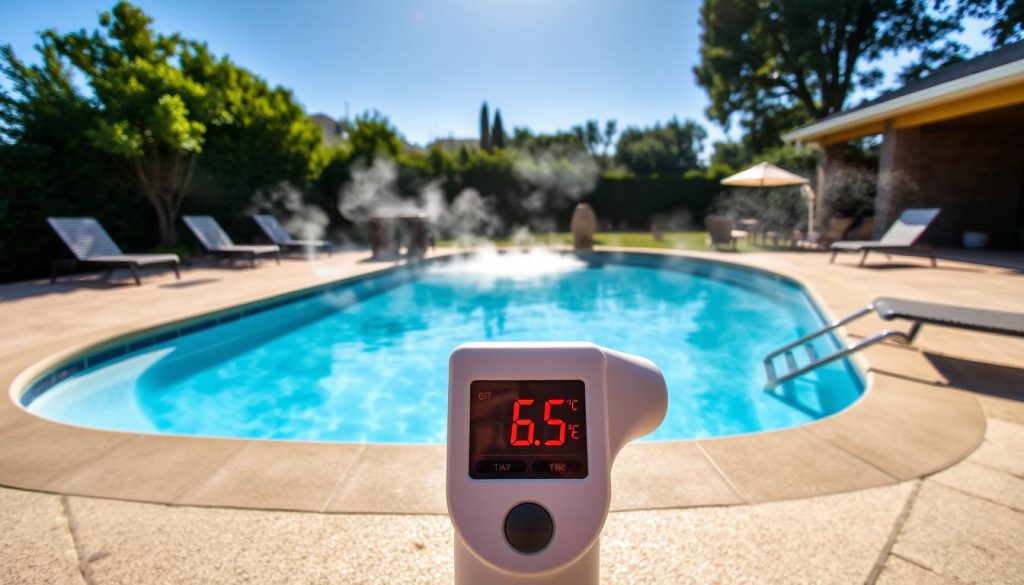
Imagine wanting to swim in your backyard pool, but the water feels ice-cold. You’ve got a pool heater, but how long will it take to warm up? The answer depends on many factors.
These factors include the type of heater, local weather, pool size, and pool covers. Understanding these can help you manage your pool’s temperature better.
Different heaters work in various ways. Gas heaters, electric heat pumps, and solar heaters all have unique heating times. Knowing how each works can help you choose the best option.
We’ll explore what affects your pool’s heating time. We’ll also share tips to heat your pool faster and more efficiently. This will help you enjoy comfortable swims whenever you want.
Factors Influencing Pool Heating Duration
Many factors affect how long it takes to heat an inground pool. Knowing these can help you make smart choices about your pool heater. Let’s explore what impacts pool heating time and efficiency.
Type of Pool Heater
Your choice of pool heater greatly affects heating speed. Gas heaters are fastest, warming pools in 8-12 hours. Electric heat pumps take 12-24 hours but use less energy.
Solar heaters are eco-friendly but slowest. They need 24-48 hours to reach the right temperature.
Local Climate and Weather Conditions
Weather plays a big role in pool heating times. Cold climates and cloudy days slow the process down. Warm, sunny regions allow for quicker heating.
Wind can make pools lose heat fast. This means it takes longer to keep the pool warm.
Pool Size and Volume
Bigger pools take longer to heat. They have more water, so they need more energy and time. Here’s a quick guide to heating times:
| Pool Size | Volume | Heating Time |
|---|---|---|
| Small | Up to 55,000 liters | 24-72 hours |
| Medium | 55,000 – 115,000 liters | 48-96 hours |
| Large | Over 115,000 liters | 72-120 hours |
Use of Pool Covers
Pool covers help keep heat in and speed up heating. They cut down on heat loss from water evaporation. Thermal covers can reduce heat loss by up to 70% when the pool isn’t used.
Using covers makes your pool heater more efficient. It also helps your pool warm up faster.
Smart choices about heaters, covers, and schedules can improve your pool’s heating. This means you’ll enjoy comfortable swimming all season long.
How Long Does it Take a Pool to Heat Up?
Heating a pool quickly depends on several factors. These include the heater type, pool size, and initial water temperature. For a standard pool, it takes 8-48 hours to raise the temperature by 10-20 degrees Fahrenheit.

The type of pool heater affects heating efficiency and time. Different heaters have varying heating times. Let’s explore these differences.
Gas Heaters: 8-36 Hours
Gas heaters are known for rapid heating capabilities. They can heat a pool starting at 50°F within 18-36 hours. This makes them the fastest option among pool heaters.
Electric Heat Pumps: 16-48 Hours
Electric heat pumps offer energy-efficient pool heating. They take 16-48 hours to achieve the same temperature increase. AquaCal heat pumps are known for their efficiency and reliability.
Solar Heaters: 24-72 Hours
Solar heaters use the sun to warm pool water. They take 24-72 hours to heat a pool. Their effectiveness depends on available sunlight. Solar heaters work best in sunny regions.
| Pool Heater Type | Heating Time (10-20°F increase) |
|---|---|
| Gas Heaters | 8-36 hours |
| Electric Heat Pumps | 16-48 hours |
| Solar Heaters | 24-72 hours |
These estimates are for an average-sized pool of 15,000-20,000 gallons. The goal is to reach 80°F in a moderate climate. Larger pools or colder temperatures may need more heating time.
Patience is key when heating a pool. Starting the heating process well in advance and maintaining a consistent schedule can help ensure that your pool reaches and maintains the desired temperature efficiently.
Tips for Faster and More Efficient Pool Heating
Upgrade to a high-performance heater like the Madimack InverElite V3 pool heat pump. This award-winning pump offers better airflow, higher efficiency, and quieter operation. It’s an ideal choice for cost-effective pool heating.
Install a thermal pool cover to improve insulation. It can keep your water up to 10 degrees warmer than using a heater alone. This creates an invisible barrier on the water surface, preventing heat loss and evaporation.
Combine a thermal pool cover with a pool heat pump for effective heating. Consider using solar sun rings or liquid solar pool covers to enhance heat retention.
Maintain a consistent temperature by running your heater on a set schedule. This prevents significant temperature drops and allows your heater to work more effectively.
Use a smart pool management system for better control over heating settings. Schedule heating during off-peak hours or optimal sun exposure periods for solar heating.
Regular maintenance of your pool heat pump and equipment increases effectiveness. It also reduces energy consumption, keeping your pool comfortable and inviting.
Embrace innovative technologies like Madimack’s pool heat pumps and sizing calculator. This helps achieve faster and more efficient pool heating. Enjoy a comfortable pool while keeping energy costs under control.







